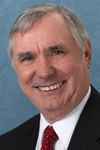Can a spinoff of the Federal Employee Health Benefits Program, which is the health insurance coverage for eight million federal workers and their families, as well as members of Congress, help some of the country’s uninsured?
Many Senate Democrats are betting it would and have proposed that the Office of Personnel Management (OPM), which manages the FEHBP, oversee national health plans as part a Senate health bill compromise reached late Tuesday to replace the public option.
Although the specifics of the proposed spinoff have not yet been released and could change, it would likely include at least two national plans from private insurers. These plans would be administered by OPM.
Trying to apply the FEHBP model to expand insurance coverage has been suggested before. Kaiser Health News staff writers contacted health policy experts about the advantages and disadvantages of such a plan and whether it would help control costs. Here are edited excerpts from those interviews:
 Robert Moffit, the director of the Heritage Foundation’s Center for Health Policy Studies and former assistant director of the Office of Personal Management during the Reagan administration.
Robert Moffit, the director of the Heritage Foundation’s Center for Health Policy Studies and former assistant director of the Office of Personal Management during the Reagan administration.
It would ironically transform OPM into something very different than it is today. The only thing OPM really does [now] is to make sure the premiums the plans offer reflect the benefits. Let’s look at what OPM is likely to do. They will likely determine the benefits that are offered. The crucial question is: how they will set premiums? We don’t know if they’ll reflect the free-market rates. Or will they reflect the health policy agenda of the White House?
I was in OPM during the Reagan administration. When [Ronald] Reagan became president, he wanted to tighten up benefits. During the Clinton administration you had the imposition of a lot of mandates that increased the cost. The Bush administration introduced health savings accounts aggressively into the program. [OPM’s] philosophical approach is going to reflect the policy of the White House. These [legislators] don’t realize it’s kind of a two-edged sword. They have the Obama administration, but you may also have the Palin administration.
 Jacob Hacker, political science professor at Yale University who first developed his signature idea of a “public option” while a graduate student a decade ago.
Jacob Hacker, political science professor at Yale University who first developed his signature idea of a “public option” while a graduate student a decade ago.
As a stand-alone policy idea, it may have potential merit, but as a substitute for a public option that produces major savings, it’s a joke. There’s no prospect that there would be serious savings from an OPM private managed plan idea. OPM is not — without substantial additional resources equipped to be able to regulate adequately a national plan. And, a national plan delivered through existing private insurers can’t be judged as a substitute for a public option.
In terms of whether it can actually be set up and run, I think it’s quite likely that one or more large national insurers would be willing to do this, particularly the Blue Cross/Blue Shield Association, but it will depend in part on how onerous or significant the regulations on that plan are.
 Gail Wilensky, an economist and a senior fellow at Project HOPE, an international health education foundation, and a former administrator of the Health Care Financing Administration (now the Center For Medicare & Medicaid Services).
Gail Wilensky, an economist and a senior fellow at Project HOPE, an international health education foundation, and a former administrator of the Health Care Financing Administration (now the Center For Medicare & Medicaid Services).
I don’t think the public option was a critical or key component to begin with. So any strategy that allows the process to move forward, in my opinion, is a good thing.
One of the real questions, and I haven’t seen enough specificity to have a good feeling about it, is: how much variation in the benefit structure will actually be allowed? When you look at FEHBP, you’ve got the $5,000 a year Mail Handler plan, and you have standard Blue Cross Blue Shield, which is $12,000 – $13,000 a year. Those are pretty big differences. The issue is what are you going to set up: a skinnied down plan with a tight network that would allow it to be low cost, or whether you insist on a very expansive plan in terms of benefits with few exclusions. The question is going to be the nature of what these plans are supposed to look like.
 Jonathan Gruber, professor of economics at the Massachusetts Institute of Technology and director of the health care program at the National Bureau of Economic Research.
Jonathan Gruber, professor of economics at the Massachusetts Institute of Technology and director of the health care program at the National Bureau of Economic Research.
I think it makes a lot of sense. FEHBP has been very successful about keeping cost growth down. It really integrates nicely with the idea of exchanges in the Senate bill. These local exchanges could have local plans, so it would provide a national plan to compete with the local plans. So I think it sounds like a sensible addition.
I don’t think it’s going to matter a whole lot in terms of cost containment. More competition is good, so I think if you have a nationally run competitor in these exchanges, that will help. Especially in areas that don’t have a whole lot of insurance options. But I don’t believe that one more insurance competitor is going to matter a whole lot for what happens to health care costs.
 Walton Francis, economist and policy analyst, author of “Putting Medicare Consumers in Charge: Lessons from the FEHBP.”
Walton Francis, economist and policy analyst, author of “Putting Medicare Consumers in Charge: Lessons from the FEHBP.”
What this plan brings is an organization that is expert in sensible, enrollee-friendly health insurance administration into the mix of providing privately-run health plans — and I hope it’s plural, not one — that would be offering their services on a competitive basis to people so they can choose from among multiple offerings. Hey, that’s called competitive markets. That’s called the FEHBP. It’s why it works. It’s very consumer friendly. There’s all kinds of positive results. … My book is all about comparing the almost 50-year performance of Medicare to the almost 50-year performance of FEHBP. … The FEHBP has won hands-down on cost control, benefit improvements, preventing fraud, preventing pork barrel spending, good governance. It outperformed Medicare hands-down on all dimensions.
 Grace-Marie Turner, president of the Galen Institute.
Grace-Marie Turner, president of the Galen Institute.
It’s just such a nutty idea. [OPM] is such a small, little organization that takes a very hands-off approach. They say: ‘here’s what the benefit plans are going to be next year, now, let’s negotiate your rates.’ The plans themselves come forward with their prices, and they know that if they offer outrageous prices, they’re not going to be [accepted]. The Office of Personnel Management is (A) not equipped to do this, B) it’s not the expertise they have, and C) it’s just another massive new government bureaucracy. It’s not a real solution. It’s just fiction.
When the Centers for Medicare and Medicaid Services which is a vastly larger organization was trying to set up a similar model for the Medicare Part D plan, it was a heroic undertaking. They pulled the trigger on Jan. 1, 2006, and it was incredibly difficult for them to do this. OPM isn’t going to be able to do what Congress wants them to do.
 Joseph Antos, a scholar at the American Enterprise Institute and former assistant director for health and human resources at the Congressional Budget Office.
Joseph Antos, a scholar at the American Enterprise Institute and former assistant director for health and human resources at the Congressional Budget Office.
The operation of the FEHBP is something of a model. If they feel that premiums are going up too high, they put some pressure on the plans. But basically they don’t tell the plans how to run their business or limit costs in particular. They say ‘we have this problem, you solve it.’ I think that’s a good model. But you have to look at all the other aspects of the reform bill, which in my opinion is [too] highly regulatory. Instead of using OPM in the way the federal program uses it, which is with a very light regulatory touch, with this program OPM will be enforcing a lot more regulations at a finer level of detail then they’ve previously had experience with.
I don’t see any [advantages.] It’s a gimmick. It’s purely a gimmick.
 Frank McArdle, principal and manager of the Washington research office of Hewitt Associates LLC, a global human resources services company. He worked as a Senate staff member and for the Social Security Administration.
Frank McArdle, principal and manager of the Washington research office of Hewitt Associates LLC, a global human resources services company. He worked as a Senate staff member and for the Social Security Administration.
One issue is going to be how much negotiating power is given to the OPM, and what are the terms of that negotiation. Right now, under the FEHBP you can’t really exclude any particular health plan that wants to play. But under this proposal, OPM would have to be given legislative power to be more aggressive about who will get in and who won’t, and more aggressive about the terms. If it were more like the current situation, where the national plan were to have to accept all bidders, that would be far less effective than if the national plan had the legal power to say [for example], ‘We’re only going to admit, 2, and that you’re going to have to compete aggressively for that, and we will negotiate aggressively with you.’ They would have more leverage than they have even now.
I advocated an idea like this 14 years ago, so I think it has potential. Politically this plan has a distinct advantage. Its roots are in same plan that members of Congress have right now, and that has appeal to it. In terms of breaking the deadlock, it appears to have the potential to do that. In that sense, its political attractiveness has enhanced over the years.
 Marilyn Moon, vice president and director of the health program at the American Institutes for Research.
Marilyn Moon, vice president and director of the health program at the American Institutes for Research.
There needs to be a lot of oversight. Those private plans aren’t necessarily doing what is best for the population. They’re doing what they think is best for their own competitive environment and other criteria. So the question is how are you holding plans accountable? From that standpoint, if you’re really finding a way to hold them accountable I think that would be an improvement.
The other thing that a public option was trying to do was [offer] something different than what might be available in an area of the country that’s dominated by one or two private plans. So that it’s not so clear to me how you offer competition to those private plans and whether the FEHBP approach is really a solution to that.
 Michael Tanner, a senior fellow at the Cato Institute who heads research into a variety of domestic policies with a particular emphasis on health care reform, social welfare policy, and Social Security.
Michael Tanner, a senior fellow at the Cato Institute who heads research into a variety of domestic policies with a particular emphasis on health care reform, social welfare policy, and Social Security.
This is a way of saving face to some degree, and having something that’s got some degree of government control so they can call it a public option. But, this I think is largely a meaningless thing. The question’s going to be who is going to play in the system. We know that in the FEHBP itself that some insurance companies are dropping out. If they set up this new parallel system, I don’t know how many companies are going to be part of it.






